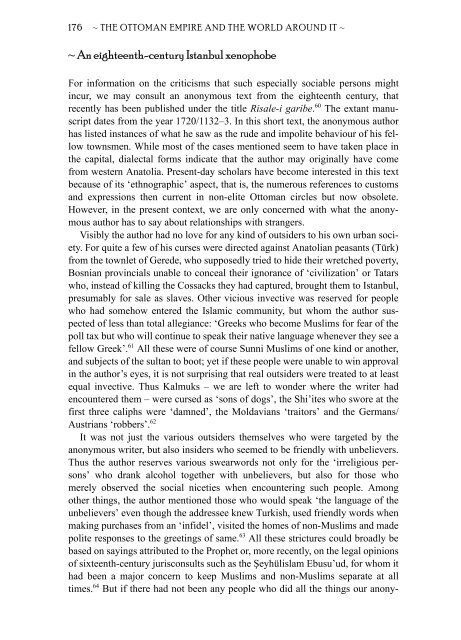The Ottoman Empire and the World Around It - Course Information
The Ottoman Empire and the World Around It - Course Information
The Ottoman Empire and the World Around It - Course Information
You also want an ePaper? Increase the reach of your titles
YUMPU automatically turns print PDFs into web optimized ePapers that Google loves.
176 ~ THE OTTOMAN EMPIRE AND THE WORLD AROUND IT ~<br />
~ An eighteenth-century Istanbul xenophobe<br />
For information on <strong>the</strong> criticisms that such especially sociable persons might<br />
incur, we may consult an anonymous text from <strong>the</strong> eighteenth century, that<br />
recently has been published under <strong>the</strong> title Risale-i garibe. 60 <strong>The</strong> extant manuscript<br />
dates from <strong>the</strong> year 1720/1132–3. In this short text, <strong>the</strong> anonymous author<br />
has listed instances of what he saw as <strong>the</strong> rude <strong>and</strong> impolite behaviour of his fellow<br />
townsmen. While most of <strong>the</strong> cases mentioned seem to have taken place in<br />
<strong>the</strong> capital, dialectal forms indicate that <strong>the</strong> author may originally have come<br />
from western Anatolia. Present-day scholars have become interested in this text<br />
because of its ‘ethnographic’ aspect, that is, <strong>the</strong> numerous references to customs<br />
<strong>and</strong> expressions <strong>the</strong>n current in non-elite <strong>Ottoman</strong> circles but now obsolete.<br />
However, in <strong>the</strong> present context, we are only concerned with what <strong>the</strong> anonymous<br />
author has to say about relationships with strangers.<br />
Visibly <strong>the</strong> author had no love for any kind of outsiders to his own urban society.<br />
For quite a few of his curses were directed against Anatolian peasants (Türk)<br />
from <strong>the</strong> townlet of Gerede, who supposedly tried to hide <strong>the</strong>ir wretched poverty,<br />
Bosnian provincials unable to conceal <strong>the</strong>ir ignorance of ‘civilization’ or Tatars<br />
who, instead of killing <strong>the</strong> Cossacks <strong>the</strong>y had captured, brought <strong>the</strong>m to Istanbul,<br />
presumably for sale as slaves. O<strong>the</strong>r vicious invective was reserved for people<br />
who had somehow entered <strong>the</strong> Islamic community, but whom <strong>the</strong> author suspected<br />
of less than total allegiance: ‘Greeks who become Muslims for fear of <strong>the</strong><br />
poll tax but who will continue to speak <strong>the</strong>ir native language whenever <strong>the</strong>y see a<br />
fellow Greek’. 61 All <strong>the</strong>se were of course Sunni Muslims of one kind or ano<strong>the</strong>r,<br />
<strong>and</strong> subjects of <strong>the</strong> sultan to boot; yet if <strong>the</strong>se people were unable to win approval<br />
in <strong>the</strong> author’s eyes, it is not surprising that real outsiders were treated to at least<br />
equal invective. Thus Kalmuks – we are left to wonder where <strong>the</strong> writer had<br />
encountered <strong>the</strong>m – were cursed as ‘sons of dogs’, <strong>the</strong> Shi’ites who swore at <strong>the</strong><br />
first three caliphs were ‘damned’, <strong>the</strong> Moldavians ‘traitors’ <strong>and</strong> <strong>the</strong> Germans/<br />
Austrians ‘robbers’. 62<br />
<strong>It</strong> was not just <strong>the</strong> various outsiders <strong>the</strong>mselves who were targeted by <strong>the</strong><br />
anonymous writer, but also insiders who seemed to be friendly with unbelievers.<br />
Thus <strong>the</strong> author reserves various swearwords not only for <strong>the</strong> ‘irreligious persons’<br />
who drank alcohol toge<strong>the</strong>r with unbelievers, but also for those who<br />
merely observed <strong>the</strong> social niceties when encountering such people. Among<br />
o<strong>the</strong>r things, <strong>the</strong> author mentioned those who would speak ‘<strong>the</strong> language of <strong>the</strong><br />
unbelievers’ even though <strong>the</strong> addressee knew Turkish, used friendly words when<br />
making purchases from an ‘infidel’, visited <strong>the</strong> homes of non-Muslims <strong>and</strong> made<br />
polite responses to <strong>the</strong> greetings of same. 63 All <strong>the</strong>se strictures could broadly be<br />
based on sayings attributed to <strong>the</strong> Prophet or, more recently, on <strong>the</strong> legal opinions<br />
of sixteenth-century jurisconsults such as <strong>the</strong> Şeyhülislam Ebusu’ud, for whom it<br />
had been a major concern to keep Muslims <strong>and</strong> non-Muslims separate at all<br />
times. 64 But if <strong>the</strong>re had not been any people who did all <strong>the</strong> things our anony-


